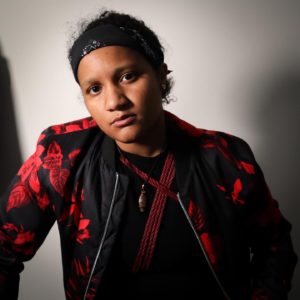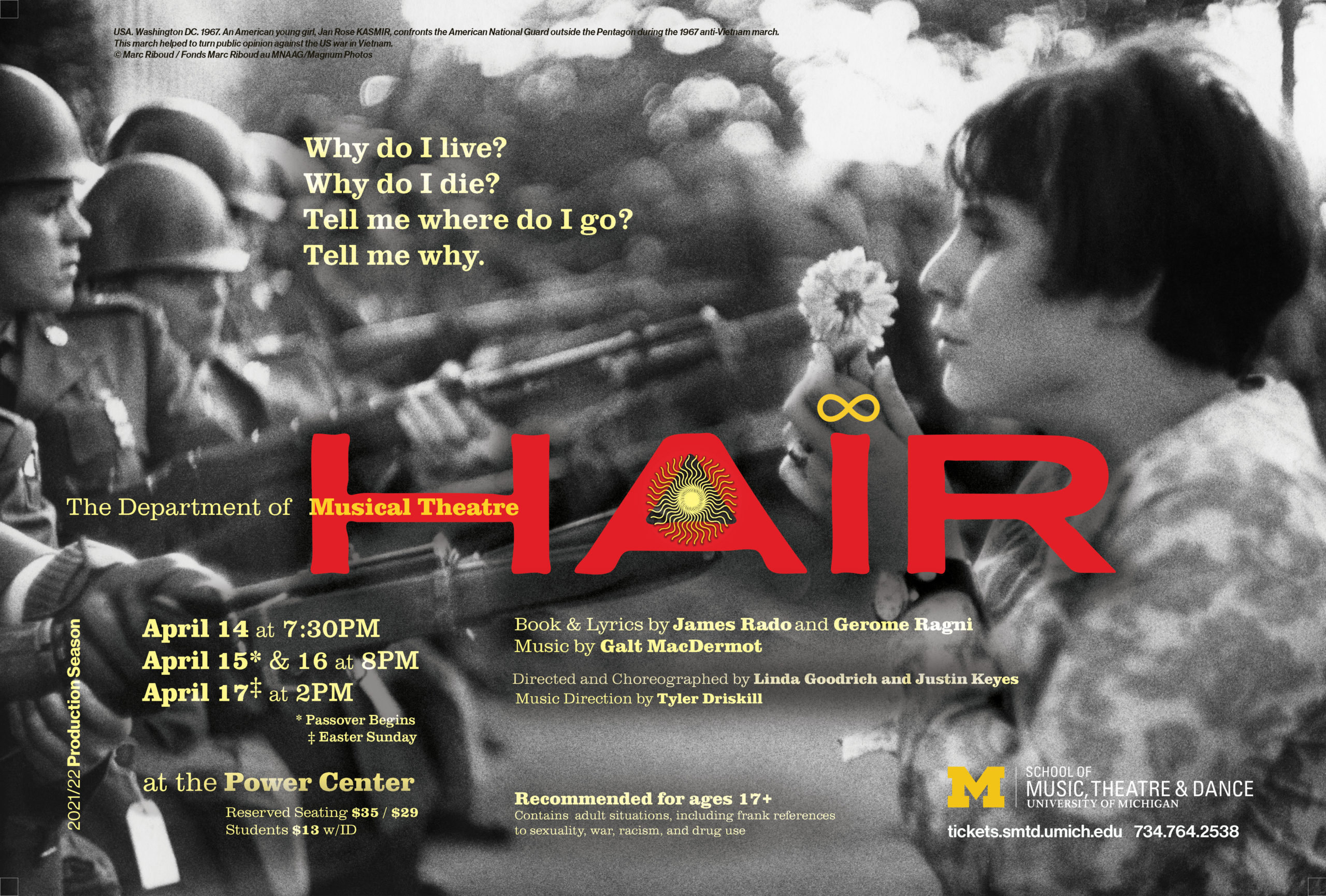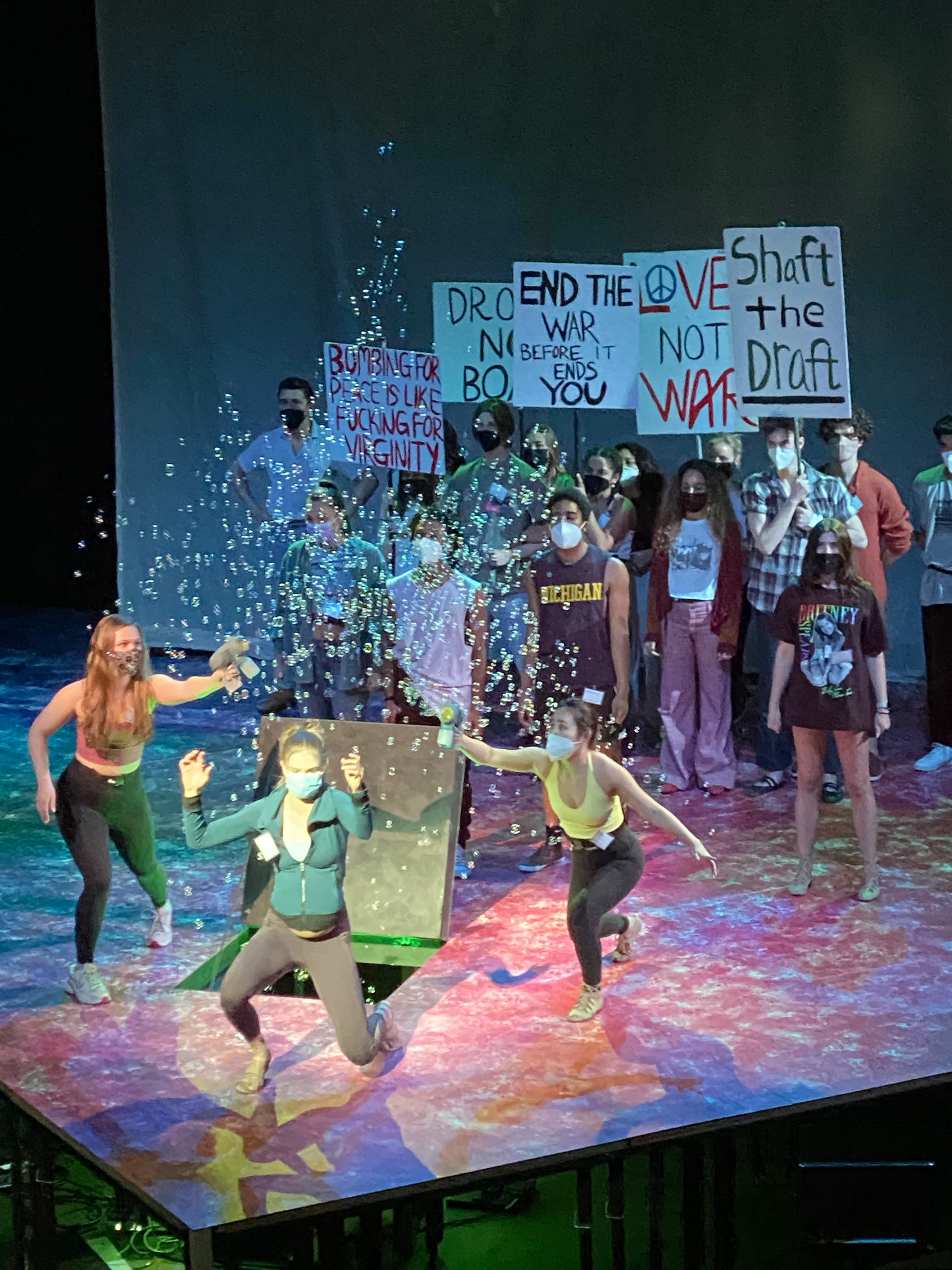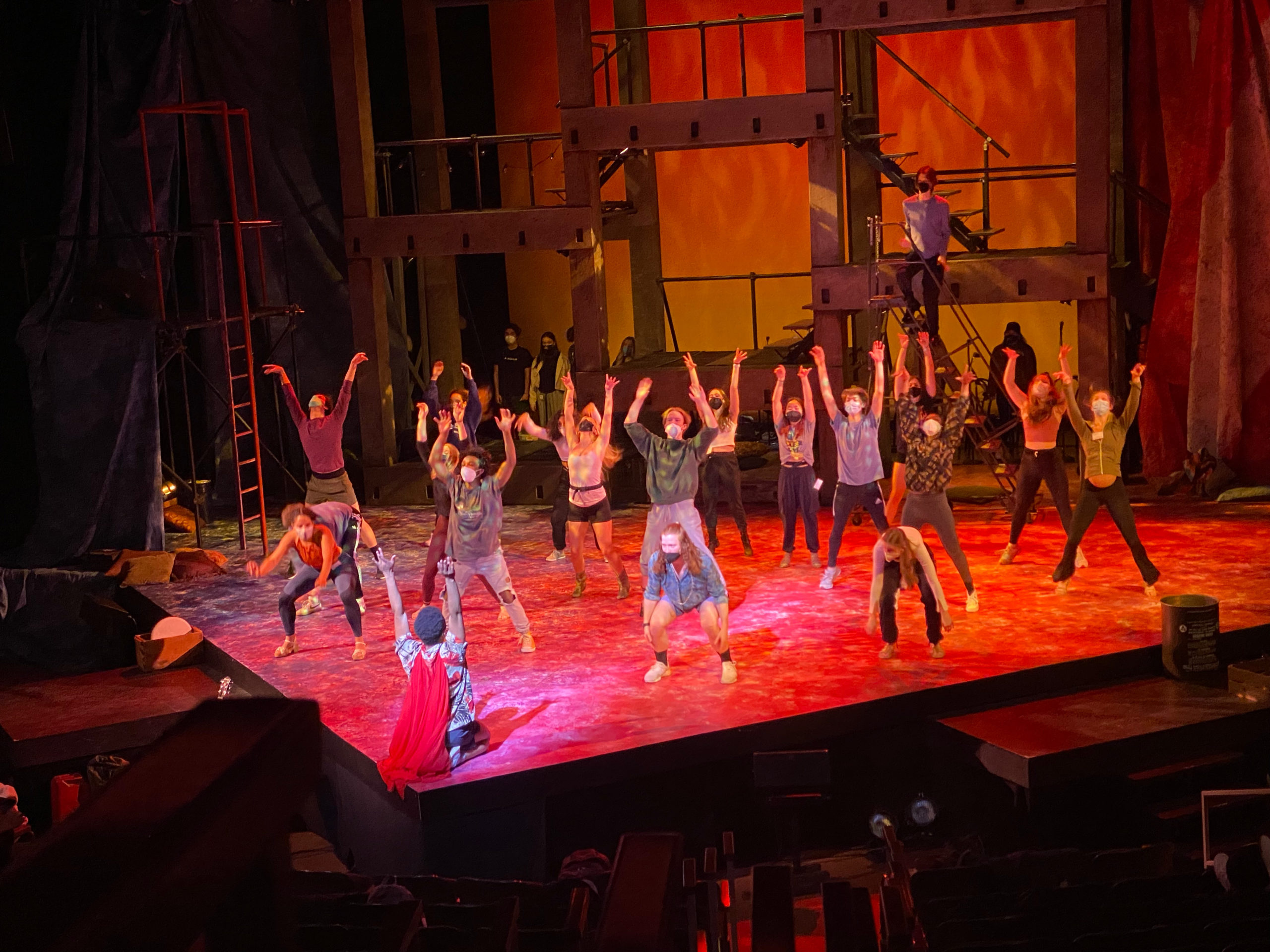The musical Hair was written to be controversial, to shock traditional theatregoers with its frank depiction of drug use, nudity, and sexuality, and with its gleeful use of obscene language. At a time when American society was deeply, bitterly divided over the Vietnam War, Hair delivered a defiant antiwar message, pleading for an end to the killing and an embrace of “beads, flowers, freedom, happiness.” Staid audience members stalked out of the theatre in the musical’s early performances, finding comfort in other Broadway offerings like Hello, Dolly! or Funny Girl, while younger people flocked to what was dubbed the “American Tribal Love-Rock Musical.”
Even as touring productions sold out venues all over the country, attempts were repeatedly made to shut them down, citing violations of decency laws and disrespectful treatment of the American flag.
Fast forward more than fifty years, and Hair still has the power to shock. The controversial aspects of the musical in 2022, however – in a world again bitterly divided, but otherwise vastly changed from the late 1960s – have shifted. Hair depicts a community of young people, known as the tribe, who are bound together by their opposition to the establishment and the Vietnam War, and by their exploration of sexual liberation and mind-expanding drugs. It is a joyous celebration of youth, freedom, and acceptance, as well as a condemnation of violence. Its approach to race and sexuality, and its attempt to embrace Eastern spirituality and American Indigenous cultural practice, seemed revolutionary and inclusive at the time, but its racially charged language and cultural stereotypes are problematic by today’s standards.
As the School of Music, Theatre & Dance (SMTD) Department of Musical Theatre prepared to mount a production of Hair – playing at the Power Center for the Performing Arts, April 14–17 – Michael McElroy recognized that specific expertise would be necessary to help the cast, crew, and creative team feel empowered and supported as they dealt with some of the challenging material. So McElroy, chair and Arthur E. and Martha S. Hearron Endowed Professor of Musical Theatre, made the decision to hire a cultural sensitivity specialist. His hope was to develop a framework “so that students have agency in the artistic process and know how to advocate for what they need, and the community knows how to support them,” he stated.

Chelsey Morgan, cultural sensitivity specialist, worked with the cast, crew, and creative team of Hair.
Chelsey Morgan, an intimacy coordinator and cultural sensitivity specialist with experience in television, film, and theatre, spent several days with the cast. They also worked closely with the creative team, led by co-directors Linda Goodrich, professor of musical theatre, and Justin Keyes, Broadway performer and musical theatre alum. Together, they combed through the script, analyzed staging, and discussed the era in which the work was created. One of Morgan’s goals was “to let people understand why this show is still done, why the show was done in the first place, and how it parallels today. We’re still protesting war, we’re still talking about racial power dynamics, we’re still talking about religion. These are the same conversations, so I really wanted to highlight those parallels and to place that history in context.”
While copyright restrictions don’t allow for any rewrites to the original script, deletions can be made – of words, lines, or even entire songs – and the staging is entirely up to each production’s creative team. While Morgan suggested a few small deletions, they kept them to a minimum, instead making more subtle changes in terms of staging and line delivery. “There’s a lot of nuance in finding moments to pause,” Morgan noted, “finding ways to stage things that give people their autonomy back, giving certain lines of songs to different members of the tribe. I think that there’s a lot of wiggle room in theatre to tell a lot of new messages with subtext as opposed to changing the text directly.” Goodrich took a similar approach, seeking to acknowledge changing norms without censoring the original work. “Our intention is to honor the work without erasure and also be sensitive to the audience today,” she stated. Keyes echoed the importance of valuing the original while mounting a production that is “culturally relevant today”; he also emphasized the primary importance of “having a safe rehearsal room environment with no one feeling harmed.”
One notable example of the work Morgan did with the cast involves the song “Colored Spade,” which is sung by a Black character named Hud, played by Sevon Askew (BFA ’23). The lyrics include a string of racial slurs that have been used against Black people for generations. “But in the context of the show,” Morgan explained, “he’s singing it as a reclamation of his history. Singing it is like, ‘You told me that I was all of these things, and all of these things were negative. When, look at me: I’m standing, I’m strong, I have culture, I have pride in who I am.’”
While some productions of Hair have chosen to remove that song entirely, Morgan felt strongly that it should stay in. “That song was not one that we even considered cutting from the show, because that’s erasing a lot of history and a lot of necessary things,” they noted. “But what we did do is sit down with the cast and break down the history of every single word and where it came from – because before any word was a slur, it was just a word.”
Morgan also suggested changes to the staging of that number, in collaboration with the cast and creative team. In the original version of Hair, Hud sings that song to a group of white characters. In this version, Hud sings to other Black members of the tribe, and they are “supporting each other and lifting each other up,” as Morgan described. This way the song becomes, they noted, “something that the Black members of the cast are doing for each other, with each other, reclaiming it for their own purposes, as opposed to for the consumption of the white audience.”
While acknowledging its challenges, Morgan asserted the importance of staging productions of Hair – with some key alterations. “There is a place in our history to recognize where we came from, where protest art has been – to highlight everything that’s wrong with the protest art of our pasts when creating new ones.” Goodrich also noted the need to approach material with sensitivity, while at the same time understanding and appreciating the achievements of past generations. She pointed out the traits Gen Z shares with the counterculture movement of the 1960s, including a commitment to social justice and a philosophy of radical acceptance of others. She acknowledged that it’s easy to judge any earlier generation for its shortcomings, but “I really hoped that the students would recognize historically that that generation made it possible for them to be who they are today. Every generation serves the next, and our freedoms today were hard fought.”
Speaking about the work they did with the musical theatre students, Morgan shared, “It was amazing to witness, to be a part of. From the very beginning, they were so open to the conversations, to be part of a creative process where they could actually speak up and remove the power dynamic of creative team versus actor or performer. I watched their humanity and their care for each other grow.” Senior Helen Shen, who portrays Crissy, expressed the value of the process to the cast: “BIPOC cast members were welcomed to speak about how elements of the text of Hair affect them. [Our cast] appreciated…that the production was prioritizing diversity, equity, and inclusion at the very start of the process.” The experience of working with a cultural sensitivity specialist did more than just help the students feel affirmed and supported in this production, Shen noted: “As a cast, we are excited and empowered to continue this work within the department and to continue it into the industry at large.”
In terms of audience reaction, Morgan expressed the hope that those who have seen Hair before will recognize, even if they aren’t aware of it, that adjustments have been made to change and improve the show’s racial and cultural dynamics. “And if it’s your first performance of Hair,” they expressed, “then it’s still going to do what Hair does. It’s going to shock you, it’s going to make you a little bit uncomfortable, it’s going to make you ask questions…and that is exactly what the show is supposed to do.” Goodrich noted that the writers of Hair purposely sought to make audiences uncomfortable, to ask themselves why they found nudity and drug use shocking but not “sending children to war.” And she expressed the importance of theatre that is provocative and challenging: “Being open to being provoked is how we grow. Discomfort is where growth happens.”





